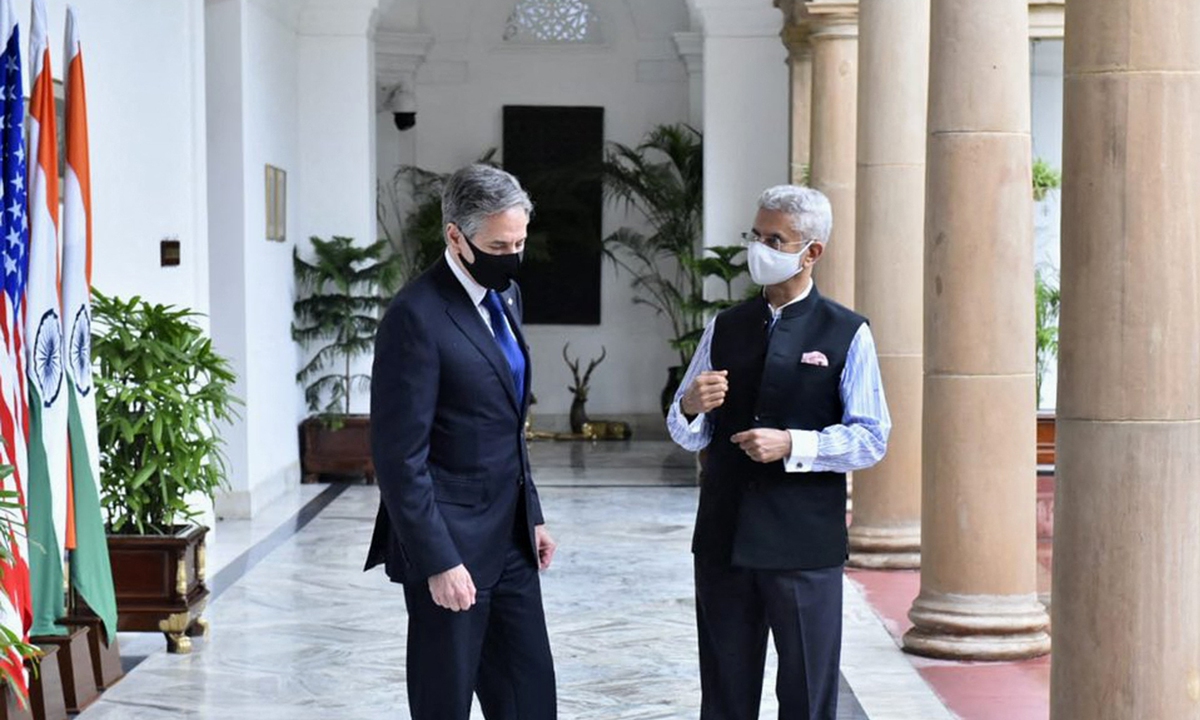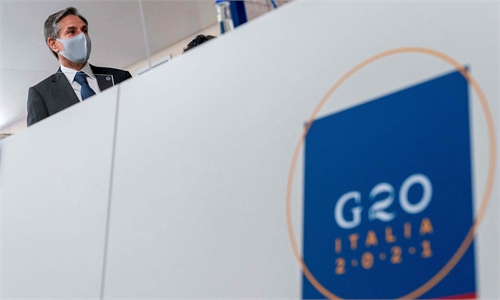Divergences could deepen between US and India as Blinken plays human rights card with New Delhi

Indian Minister of External Affairs Subrahmanyam Jaishankar (right) welcomes US Secretary of State Antony Blinken at Hyderabad House in New Delhi ahead of a meeting on Wednesday. Photo: AFP
US Secretary of State Antony Blinken warned India not to backslide on democracy on Wednesday during his visit to the country.India is often called by the US and other Western media countries as "the world's largest democracy" in terms of population. The US and the West have set India up as a model for the success of democracy in the developing world. It propped up to serve as a foil in this regard for China's democratic situation. Even though India has many serious human rights problems, the US and Western governments and media outlets mostly ignored them. Even if there are occasional criticisms, they are understated, let alone condemned.
By American and Western standards, India's human rights situation has further deteriorated in recent years. First, The Indian government has stripped the Indian-administered segment of Kashmir of its autonomy. The scrapping of autonomy by the Indian parliament was preceded by a communications and internet blackout. It saw the deployment of tens of thousands of soldiers on the streets of the contested Muslim-majority region.
Second, the Indian parliament passed the Citizenship Amendment Act in December 2019. The new amended citizenship law fast-tracks asylum claims of irregular immigrants from the neighboring Muslim-majority countries of Afghanistan, Bangladesh, and Pakistan, but excludes Muslims. These human rights violations in India have attracted concern in the US, especially condemnation from American Muslims. Two Indian-American congressman Rohit 'ro 'Khanna (California) and Pramila Jayapal (Washington State) have raised issues such as the farmers' agitation in India after the passage of the farm laws. They have also addressed the situation in Jammu and Kashmir concerning human rights issue before Blinken's visit.
In addition to the above-mentioned human rights issues, according to the "2020 Country Reports on Human Rights Practices: India" from US Department of State in March, there are other serious human rights violations in India. These entail bonded labor and forced and compulsory child labor; torture and cases of cruel, inhuman, or degrading treatment or punishment by some police and prison officials; harsh and life-threatening prison conditions; tolerance of violations of religious freedom; and the trafficking, sexual abuse of women.
In response to criticism from Washington, New Delhi believes that measures are necessary to counter terrorism and maintain stability in Kashmir. On the other hand, New Delhi believes that the US, which has serious human rights problems of its own, is not qualified to be a teacher o f "human rights" for India and has no right to interfere in India's internal affairs. It's impossible for the Indian government to accept Blinken's criticism and pressure or to change India's domestic policy. Instead, India is willing to teach Washington a lesson on how to practice democracy and protect human rights in a diverse country.
Indian and many other countries that were colonized recognize that "human rights issues" are a tool for Western countries to highlight their strength — brandishing their civilization, values and systems as superior. The US and other Western countries, regardless of cultural differences and differences in economic and social development levels, impose Western human rights standards on other countries as an excuse to interfere in their internal affairs. Their aim is to be superior to the developing countries in Asia, Africa and Latin America. They want to shape the mentality that developing countries are wrong, guilty and inferior when faced with the West, carrying out the spiritual colonization in the countries in Asia, Africa and Latin America.
India has a very strong legacy of civilization, and is highly sensitive to safeguard its national sovereignty. India often stresses with the US that the two countries share common values. It can also admit that human rights are universal values and would like to see the US play the human rights card as an excuse to interfere in China's internal affairs. But New Delhi cannot accept Washington's meddling in India's human rights issues.
Washington needs to draw New Delhi into its strategic competition with China, but it still exerts pressure on India on human rights issues. This is a usual diplomatic strategy of the US: While it tries to woo some other countries, Washington will also maintain pressure on them. This also clearly indicates that India is of little value to the US beyond the issue of containing China both ideologically and geopolitically.
Long Xingchun is a senior research fellow with the Academy of Regional and Global Governance at the Beijing Foreign Studies University and president of the Chengdu Institute of World Affairs. Liu Beiling is an intern from School of International relations at Sichuan International Studies University. opinion@globaltimes.com.cn


